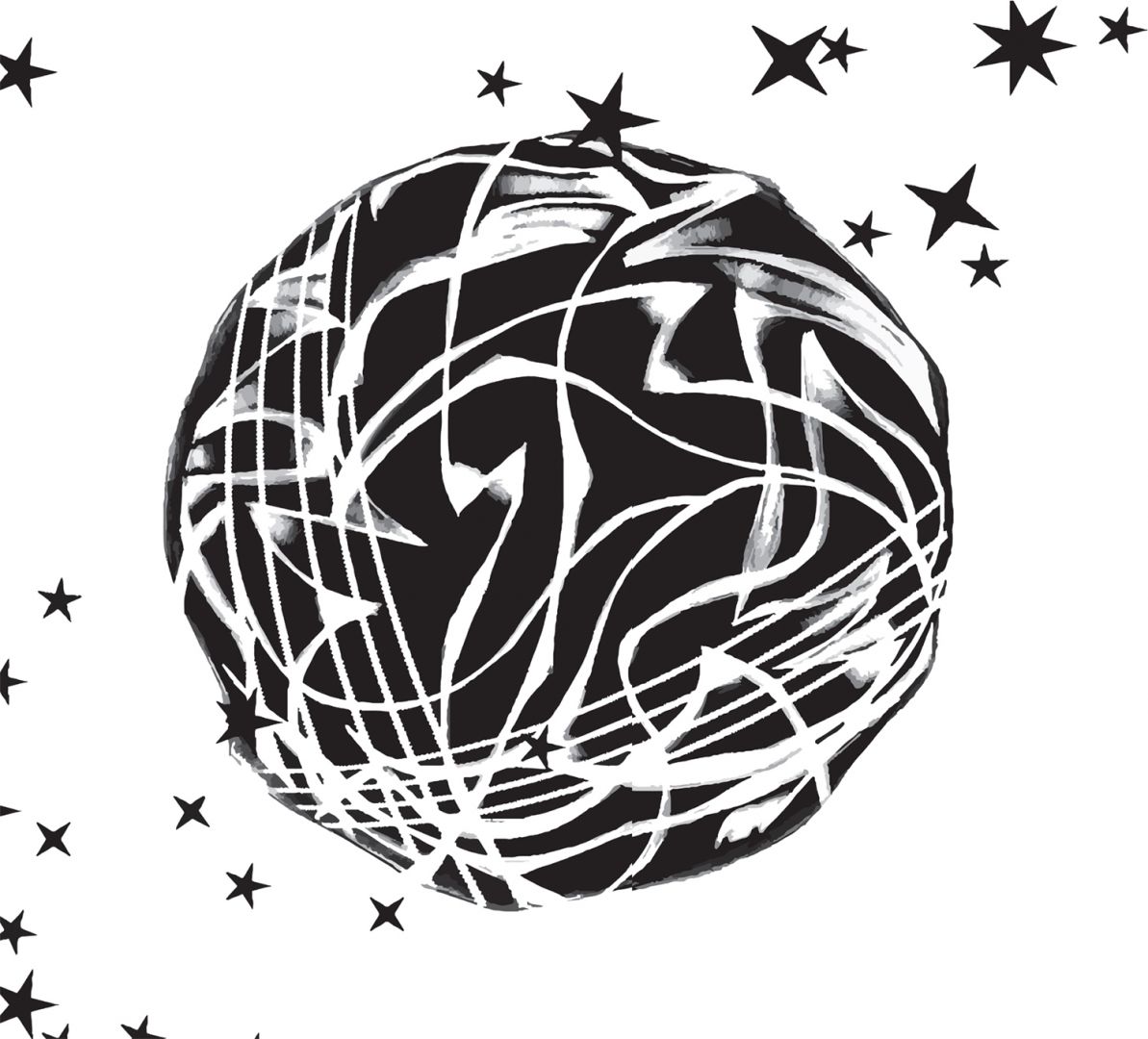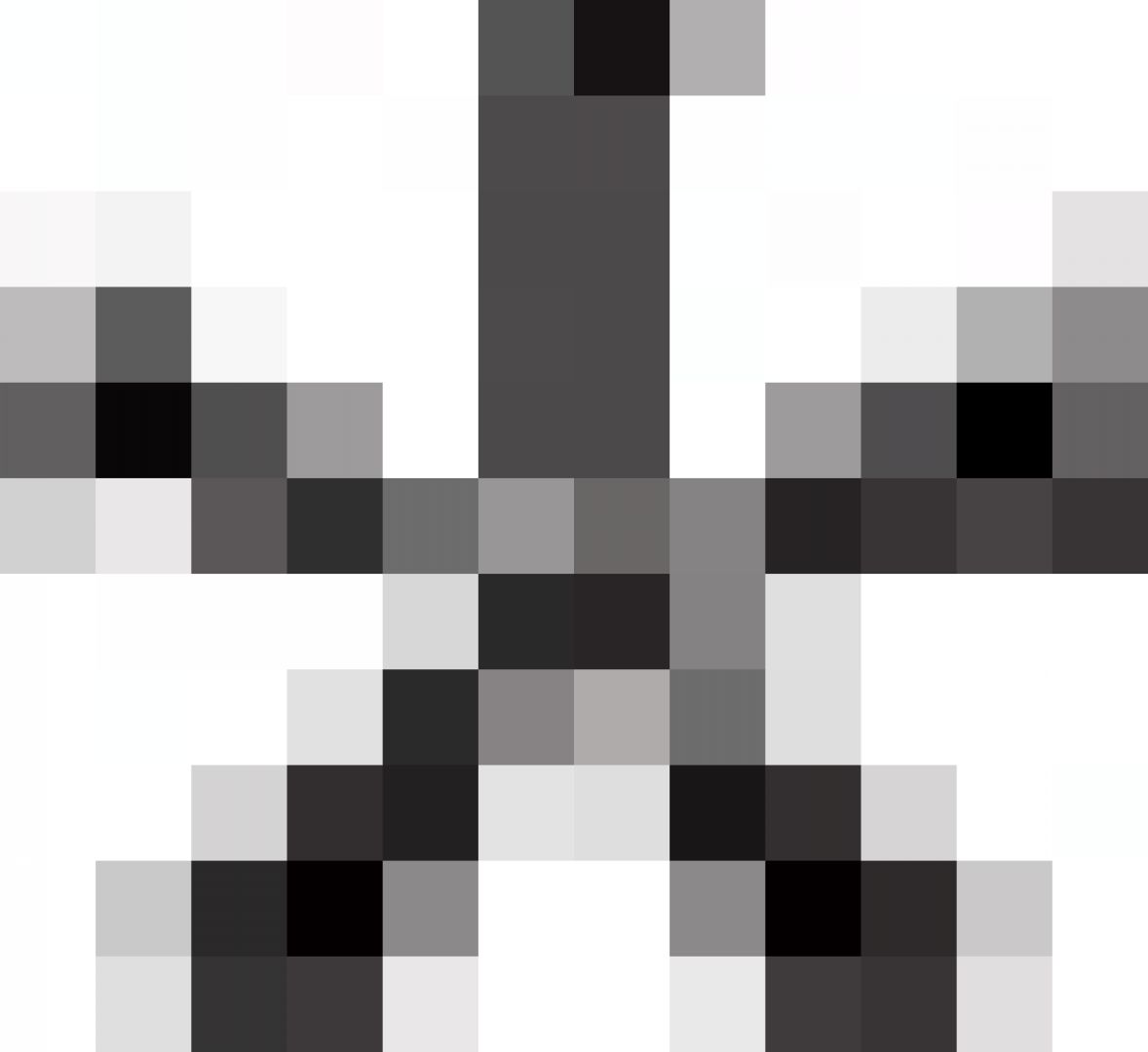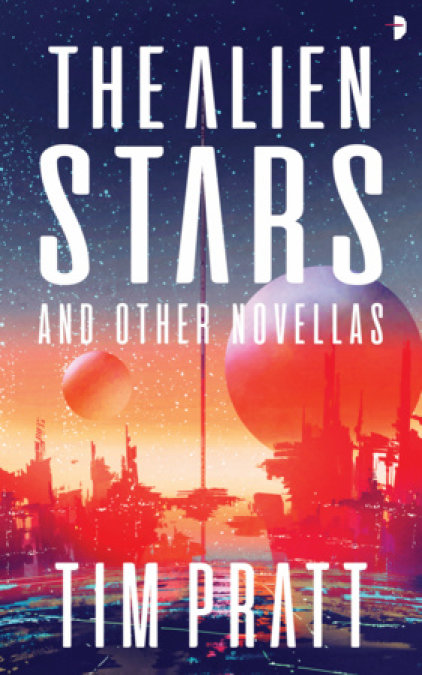
THE AUGMENTED STARS

Delilah Mears settled into the pod in the Hypnos parlor on New Meditreme. The pod closed over her, and she underwent a moment of swirling disorientation before opening her eyes in a cluttered machine shop that smelled of hot metal and solvents.
This was supposed to be a job interview, but the interviewer wasn’t in evidence. “Hello?” she called. No response. Well, she was a couple of minutes early. She hadn’t wanted to risk being late. She didn’t really needthis job, not this one in particular… but she wanted it. Doing the interview in a simulation was a little strange, since she’d already come all the way out to Trans-Neptunian space anyway, but maybe the captain was busy preparing for the voyage and this was easier to schedule.
Delilah paced back and forth beside a table cluttered with hand tools, snips of wire, shiny gear wheels, circuit boards, and weird stuff like faintly shining blue crystals and palm-sized cubes of greasy black material. Pegboards on the walls held more tools, coils of cord, and protective equipment. The lights overhead were long strips of steady whiteness, illuminating the space as thoroughly as an operating theater.
She leaned closer to the table and grunted – she could see the wood grain in the top, and when she ran her thumb across the surface, the tiny irregularities and indentations felt completely real. This simulation was far more realistic than the low-res headsetsand-gloves stuff she’d used for training in engineering school; she’d never been much for recreational interactive immersives, but she hadn’t realized they’d come this far.
“Pretty nice, huh?”
Delilah looked up into the face – if you could call it that – of a cyborg. Instead of eyes he had complex clusters of lenses, and very little flesh showed through a mask of copper-colored metal, though he had a human smile and chin. He held up his hands– “Didn’t mean to startle you” – and one of his arms was artificial too, encased in translucent crystal, gears and pistons visible underneath the casing.
“Dr. Ranganathan?” She looked down at her own avatar, which was just a simple scan of her real body taken when she stepped through the door of the Hypnos parlor, dressed in a plain gray jumpsuit. “I feel underdressed.” She knew people sometimes appeared in fanciful avatars, elves and pirates and dragons, but she hadn’t expected something like that from a ship’s captain in a job interview.
“Call me Ashok. You mean the cyborg thing? Huh. I was about to argue, because this avatar is based on a scan of my body, but to be fair it’s a few years out of date, and it’s true – I don’t look like this anymore.”
Delilah blushed and wondered if her avatar would do so too; how responsive was this technology? “Oh, I’m sorry, I didn’t know you were, ah…”
“Augmented? No problem. You’re from Earth, right? New on New Meditreme?”
“Isn’t everyone new here?” New Meditreme station had been built only a few years ago, and parts of it were still under construction. She’d walked here through corridors that still smelled of offgassing polymers. The original Meditreme Station had been destroyed in what was either a terrible accident or a more terrible terrorist attack – accounts varied – with all 50,000 of its residents killed. The tiny corporate polity known as the Trans-Neptunian Alliance had nearly perished with its capital, but the TNA had since been reconstituted. Their first order of business was building a new city-station named in honor of the lost one, and they once again ruled inhabited space on the fringes of the solar system. The new TNA had developed a reputation for innovation; they had impressive proprietary tech, and their president was supposedly an artificial intelligence, though back home everyone thought that was a publicity gimmick, and assumed the organization was secretly run by a human board of directors. The TNA’s reputation for daring drew the ambitious, the impatient, and the innovative from all over the inhabited galaxy, and Delilah considered herself all three.
“Oh, some of us are newer here than others,” Ashok said. “I used to call the old Meditreme Station home.”
Wow – he must have been one of the few residents who’d been off station when the place exploded. “I’m so sorry. I didn’t mean to be insensitive.”
His eye lenses spun, and after a moment, he chuckled. “Don’t worry about it. I wasn’t hurt. My friends tell me I can be insensitive occasionally myself, and even with all my upgrades, I don’t always realize it.” His lenses shifted again, one lighting up with a golden glow. “So. I’ve got your résumé here, and you’re totally qualified to be my ship’s engineer. You went to Mumbai Tech! I got waitlisted there and ended up at Lunar University.”
“That’s a good school,” Delilah said, and it was; it was just that Mumbai Tech was a great school.
“I’ve got no complaints, but practical experience was my real teacher. You can do simulations all day, but repairing a breached reactor in an immersive isn’t the same as doing it in space where, if you mess up, everybody dies, and you die first.”
“I know I don’t have much actual work experience but–”
He shook his armored head. “Oh, whoa, no, wait, that came out wrong. I don’t mean, like, ‘don’t come in here with your fancy book learning.’ I mean, you’re more qualified than I was when I started out, and I ended up being a pretty good engineer, so once you log some time in space, you’re going to be better than I ever was, I bet. I am kind of wondering, though… why come all the way out to the edge of the galaxy and try out for a spot on a ship heading to deep space? With your qualifications you could get a job that pays more and is less likely to, uh, well, end up with you irradiated or exposed to vacuum or worse things.”
Delilah considered how to answer, and decided honesty was best. “I came out here because I grew up on Earth, and my whole life has been spent learning the skills necessary to get me out of the gravity well and into the unknown. I love engineering, obviously – I’m at my happiest tinkering around inside a ship – but for me, that study was all a means to an end.”
“What end?”
“Just… going as far as I can. I turned down jobs on Earth, Mars, and Luna, and I was actually on Ganymede, doing interviews with a few different Jovian Imperative companies, when I saw your listing on the Tangle.” She had, in fact, been offered a cushy job on Ganymede, but if this worked out…
“I can’t pay as well as the Almajara Corporation can,” Ashok said. “I’ve got a ship, and it’s in good shape, but my budget is… basically what I got for this.” He knocked on the work table.
“For… what?”
“This tactile texture thing. Feel how real the wood seems? I did that.”
“Oh! I didn’t know you did software design.”
“Me neither. I was always a hardware guy, but for personal reasons, I took an interest in simulation technology a couple years ago, and figured out how to improve tactile detail. My friend Callie said I should have licensed the tech, not sold it outright, but then people would be bugging me to do updates and stuff, and – well, it’s like you said. The software was a means to an end. I wanted seed money for deep space explorations, and I got some, but I’m not rolling in lix, and you won’t be fixing the light bulbs on a luxury liner if you sign up with me. It’s going to be real nuts and bolts and radiation and hard vacuum stuff.”
“I understand.”
He grinned, which was disconcerting, but also charming. “So you’ll take the job?”
“Does that mean I have the job?”
“You had the job as soon as you told me why you wanted it. A one-year contract to start, but the penalties if you break it aren’t substantial, as long as you don’t try to leave during, like, a critical drive failure.”
“That works for me.”
“Nice. You know, I came out here to Trans-Neptunian space for all the same reasons you did. I wanted to know: what’s on the other side of the far side of everything?” His lenses both glowed gold now. “Why don’t we go and find out?”
“It feels so real.” Delilah bounced on the balls of her feet as they walked down the corridor toward their dock.
Her new crewmate – she was on a crew! – looked at her curiously. Winslow had dark skin that contrasted with a fuzz of bright yellow hair and shining blue eyes, and he wore a black jumpsuit that covered every bit of his skin up to the chin. “What does?”
“The gravity!”
Winslow chuckled. He was her new ship’s doctor and first officer, and thus technically her superior, but over the course of get-to-know-you drinks at the New Spinward Lounge he’d proven himself informal and affable. They both dragged rolling suitcases behind them. “I did hear artificial gravity is still pretty rare on the other side of the asteroid belt.”
Delilah nodded. “Back home they’re trying to reverse engineer the tech, but nobody’s managed it quite yet, as far as I know.” She was itching to get a look at one of the gravity generators herself.
“It’s all going open source in five more years,” Winslow said. “The TNA is only keeping the tech proprietary long enough to stabilize themselves financially. Rebuilding a nation from ashes is tough.” Winslow cocked his head at her. “Our boss invented it, you know.”
Delilah looked at him blankly. “He… invented what?”
“Artificial gravity. Well, he discovered it, technically – it’s ancient alien tech – but Ashok is the one who figured out how to crack open the alien black box and replicate the effects.”
“That’s… but… why isn’t he a trillionaire? He said he was funding this expedition with money from simulation software!”
Winslow nodded. “He’s very close with Kalea Machedo and President Shall – he used to be on a crew with them – and he donated his work on artificial gravity to the TNA. He refused all proceeds, and insisted his rightful share be poured back into infrastructure. He won’t even let them put his name on any buildings.”
Delilah whistled. “Modest guy.”
“Not exactly,” Winslow said. “It’s just… he doesn’t care about that stuff. He told his friends they should name buildings after people who care. Money doesn’t interest him, either, as long as he has enough to fund things like this expedition. Which, incidentally, the TNA offered to cover, but he said, no, he didn’t want to dip into their funds. To him, making money is just another engineering problem. He sketched out how much he needed, did enough work to cover it, and moved on to the next problem.”
They reached airlock NMS-18, and Winslow put his eye to a scanner. The door unsealed and they stepped in. “You’ve known the captain for a long time?” Delilah asked.
“Not really. We spent some time on the same station a while back, and when he started putting a crew together, he thought of me.”
They waited a moment for the airlock to match pressure, and then, there it was: the door to the Golden Spider, which would be her home for the next few months (or her grave, if things went bad, but they wouldn’t). They entered through the cargo bay, which was mostly empty, though the walls were lined with supply crates, and she noticed one box that was three meters to a side and held together with fist-sized bolts.
A Liar dropped from above and landed in front of them. The small squidlike alien – the size of a human toddler at most – wore a bright orange suit and had around half a dozen pseudopods, a few holding tools. Its head – which was more of a domelike bulge from its central body – had just a single pair of forward-facing eyes, an unusual configuration in Delilah’s admittedly limited experience; Liars usually had lots of eyes scattered all around their heads.
“This is Crowbar,” Winslow said. “He’s our communications tech and backup pilot. Crow, this is Delilah Mears, our engineer.”
“You are shorter than average for a human,” the Liar said, a melodious tenor emerging from his artificial voicebox.
“I keep hearing that,” Delilah said. “I grew up on Earth, though. The gravity keeps us from stretching out too much.”
“My own comparatively small stature does not inhibit my ability to function with excellence,” Crowbar said. “Though I have the advantage of more appendages. Have you considered adding some augmentations to your basic form?”
“Okay, Crow,” Winslow said. “How about we let Dr. Mears get settled before we interrogate her life choices?”
“You emphasized her title as a subtle rebuke,” Crowbar said. “To encourage me to be more respectful. But I have no inherent respect for the standards of higher education in human cultures, so my opinion cannot be shaped by such signifiers. I will form an opinion of Dr. Mears based on direct observation. I will share my determinations once I have gathered more data. I am going to check the aft communications array now.” Crowbar scuttled off and disappeared behind a crate.
“He was… very direct,” Delilah said.
“Have you spent much time with the Free?”
That’s right–”the Free” was what Liars called themselves among themselves. At least sometimes. At least some of them. The aliens were hard to generalize about. “Not really. There are only a few of them on Earth. ...
We hope you are enjoying the book so far. To continue reading...
Copyright © 2026 All Rights Reserved


